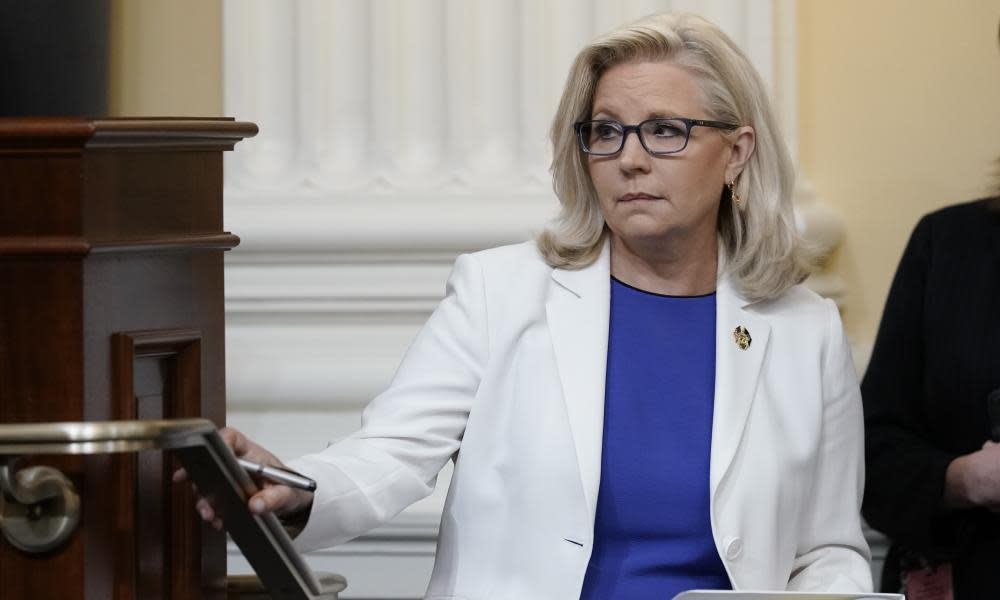Liz Cheney looks set to lose Congress seat to Trump-backed rival

- Oops!Something went wrong.Please try again later.
- Oops!Something went wrong.Please try again later.
- Oops!Something went wrong.Please try again later.
Widely praised for her defence of democracy during the January 6 committee hearings, Liz Cheney looked set to lose her seat in Congress on Tuesday to a rival backed by Donald Trump.
Related: Republicans rue price of fame as celebrity Senate candidates struggle
Opinion polls showed Cheney trailing far behind the conservative lawyer Harriet Hageman – who has echoed Trump’s false claims of widespread voter fraud – in a Republican primary election to decide Wyoming’s lone member in the House of Representatives.
Victory for Hageman would continue a winning streak for Trump-backed candidates in congressional primaries and deal a blow to remnants of the Republican party establishment.
Cheney is vice-chair of the House panel investigating the deadly attack on the US Capitol on 6 January 2021. She has used televised hearings to eviscerate Trump and members of her own party who remain loyal to him and his “big lie” that electoral fraudsters caused his defeat by Joe Biden in 2020.
The three-term congresswoman made the existential struggle for American democracy a central part of her re-election campaign in Wyoming.
In a closing video message, she said: “America cannot remain free if we abandon the truth. The lie that the 2020 presidential election was stolen is insidious. It preys on those who love their country. It is a door Donald Trump opened to manipulate Americans to abandon their principles, to sacrifice their freedom, to justify violence, to ignore the rulings of our courts and the rule of law.”
After voting in Jackson, Wyoming, on Tuesday, Cheney told CBS News the primary was “certainly the beginning of a battle that is going to continue to go on. And as a country, we’re facing a moment where our democracy really is under attack and under threat.”
But her status as an unyielding leader of the anti-Trump resistance alienated many Wyoming Republicans, many of whom accuse her of putting personal ambition in Washington ahead of her constituents at home.
She trailed Hageman 52% to 30% in a survey of likely primary voters from 7 to 11 July published by Wyoming’s Casper Star-Tribune. A University of Wyoming poll released last week put Hageman’s lead at 29 points.
Supporters of the 56-year-old daughter of former vice-president Dick Cheney believed she would have a fighting chance if enough Democrats and independents crossed over and voted for her, which is allowed in the Wyoming primary system.
But political strategist Terry Sullivan, who managed the Republican senator Marco Rubio’s 2016 presidential campaign, regarded Cheney’s defeat on Tuesday as a “foregone conclusion”, as part of a larger battle.
“Liz Cheney isn’t fighting for re-election – she’s fighting for the direction of the Republican party,” he told Reuters, noting that some observers have discussed whether Cheney should mount a presidential campaign in 2024.
“It’s more of a kind of a beginning, not an end.”
Cheney supported Trump’s agenda 93% of the time, according to the FiveThirtyEight website. But she was stripped of her role as the No3 House Republican for voting to impeach him on a charge of inciting the January 6 Capitol attack.
She was among 10 House Republicans to do so and to earn the former president’s wrath and vow of revenge. Three others have already lost their primaries – four decided not to run again and two won their contests.
The fate of another Trump adversary, Senator Lisa Murkowski of Alaska, was less clear on Tuesday as the state’s non-partisan primary format allows the top four vote-getters to advance to the 8 November general election, which could bring a possible rematch of Murkowski and Trump-backed Kelly Tshibaka.
Alaska voters will also determine whether to pick Sarah Palin, a former governor and 2008 vice-presidential nominee whom Trump endorsed for the state’s only House seat.
Palin finished first among 48 candidates to qualify for a special election seeking to replace congressman Don Young, who died in March at age 88, after 49 years as Alaska’s sole House member.
Palin is on Tuesday’s ballot twice: once in a special election to complete Young’s term and another for a full two-year House term starting in January.
Most of the candidates Trump has backed this election season have triumphed in what his supporters say is a sign of his continued sway over the party as he considers whether to run for office again in 2024.

